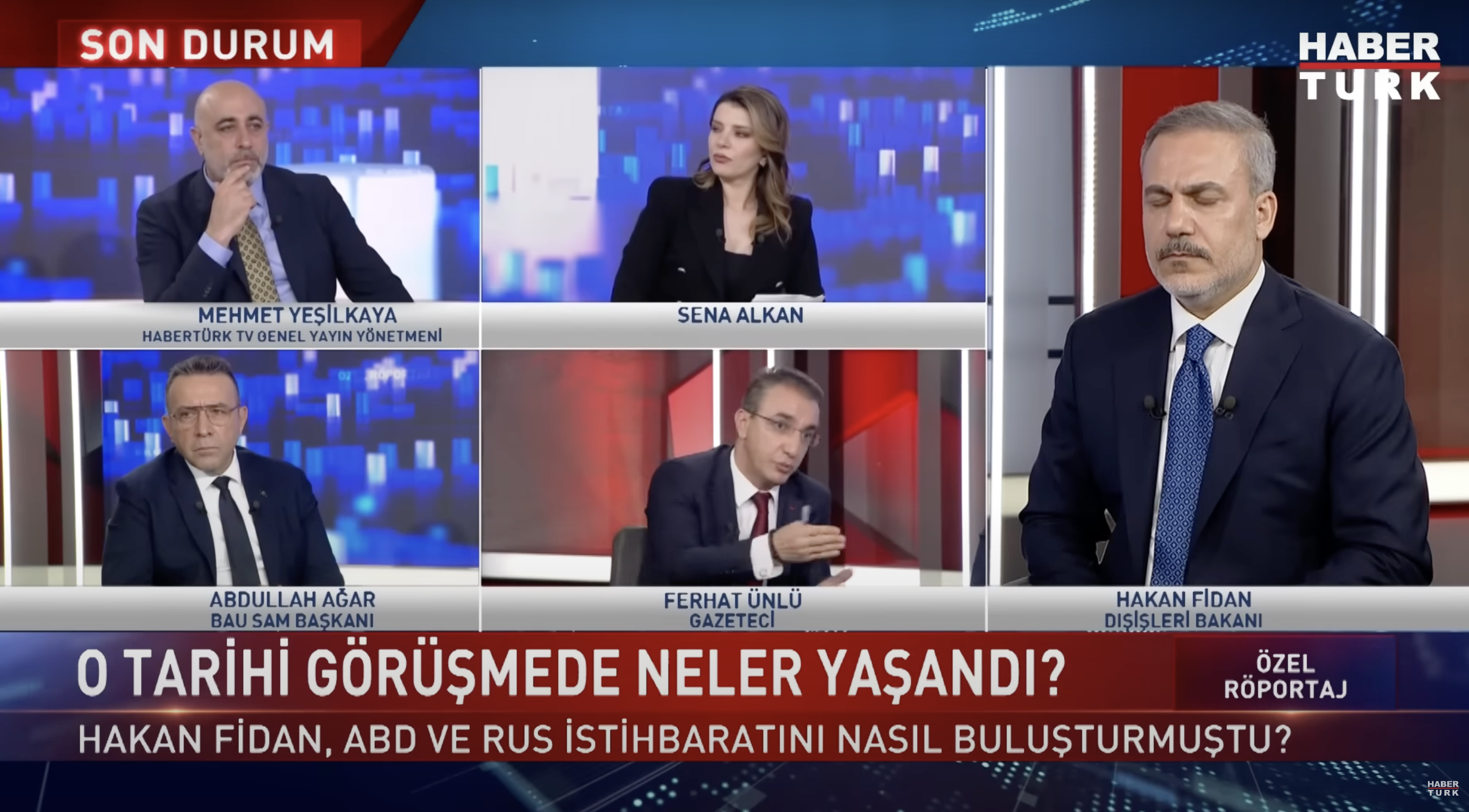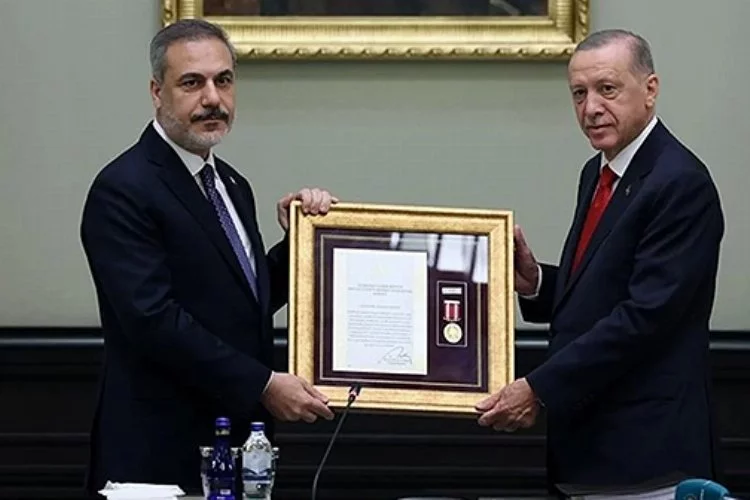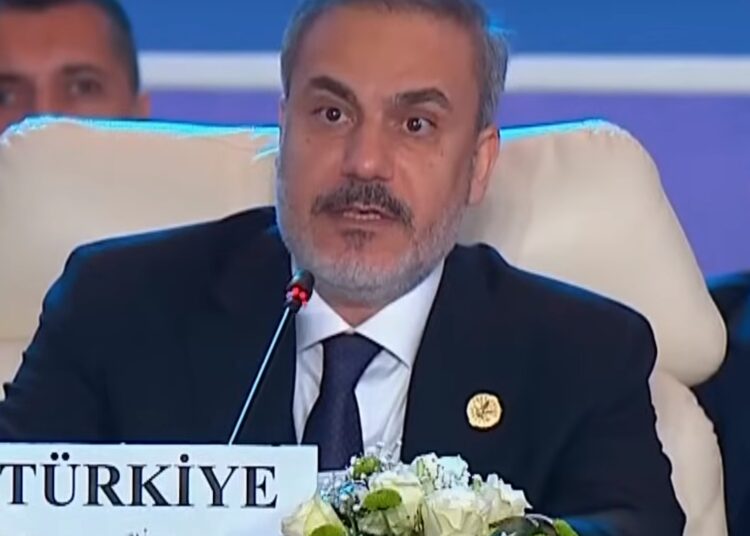Levent Kenez/Stockholm
Turkish Foreign Minister Hakan Fidan defended his ongoing restructuring efforts aimed at transforming the ministry into an intelligence center, emphasizing that the integration of the Ministry of Foreign Affairs with the National Intelligence Organization (MİT) would accelerate.
Fidan responded to questions from journalists known for their ties to MİT on Habertürk TV on Monday, stating that following his tenure as the head of MİT, he is now endeavoring as the foreign minister to institutionalize the value of intelligence for the state. Highlighting its past success with the Turkish Armed Forces, he emphasized that it is now the ministry’s turn to undergo similar efforts.
“We should clearly communicate our demands and needs in foreign policy to the intelligence services so that they can prioritize their limited resources effectively,” Fidan told the journalists. He also spoke about the need for diplomats implementing foreign policy to utilize intelligence services effectively to gain an advantage.

Fidan emphasized that the Ministry of Foreign Affairs is an integral part of the national security apparatus, stressing the necessity of acting in accordance with this reality. He highlighted the importance of implementing structural reforms based on intelligence within the ministry, expressing the need for personnel recruitment based on these requirements and the necessity of training existing staff according to the new structure.
During the interview Fidan, who drew attention for speaking more like a bureaucrat still at the helm of MİT than a foreign minister, advocated for a structure resembling the Soviet-era system where diplomats also served as intelligence agents. He emphasized the need for all institutions with international engagement to coordinate within an intelligence pool to provide accurate briefings to President Recep Tayyip Erdogan.
Nordic Monitor previously reported on concerns surrounding appointments to the foreign ministry. One of the most notable names in the recent round of appointments is Nuh Yılmaz, a former press counselor and head of the counterintelligence section at MİT. Rumored at the time that he would be appointed a deputy minister, Yılmaz was instead named head of the Center for Strategic Research (SAM) and an advisor at the ministry. It appears that Fidan has finally succeeded in having him assigned as his deputy, almost a year after taking office. Yılmaz has a track record of overseeing agents and informants in traditional Turkish media outlets and online news websites, with some involved in the dissemination of conspiracy theories.
During a conference at Istanbul University on December 15, 2023, Yılmaz announced ongoing efforts aimed at reshaping the ministry’s institutional framework and human resources policies. According to Yılmaz, these initiatives signified an upcoming change in the prerequisites for aspiring diplomats. He hinted at the likelihood of future changes, suggesting that proficiency in the English language might not remain mandatory for all individuals hoping to pursue diplomatic careers.
Additionally, Ümit Ulvi Canik, formerly MİT’s legal counselor, has been appointed to the Directorate General of Legal Services at the foreign ministry. Canik was previously embroiled in a scandal related to the interception of a truck loaded with arms and ammunition in 2014, allegedly destined for al-Qaeda groups in Syria. Canik had represented MİT in various legal cases and played a role in obstructing the search of the truck.
Hacı Ali Özel, formerly a deputy to Fidan, has been assigned as director general of personnel. His return to the ministry signals Fidan’s efforts to assemble a team aligned with his goals, since the Erdogan government had removed around 30 percent of the total diplomatic staff, more than 700 employees, including veteran ambassadors, from the ministry after a controversial coup attempt in 2016, which sparked a witch hunt against dissidents within state institutions. A large number of the open positions were then occupied by loyalists, supporters and politically appointed individuals who were not career diplomats.

Gürsel Dönmez, who previously collaborated with Fidan at MİT, has been appointed Fidan’s chief advisor. Dönmez, who led the Austrian branch of the Union of International Democrats (UID) and served as an initial vice president of the Presidency of Turks Abroad and Related Communities (YTB), is known for his involvement with diaspora communities in Europe, a recruitment strategy employed by the Turkish intelligence agency.
A critical appointment is that of Fatma Ceren Yazgan, a former ambassador to Georgia, who will lead the ministry’s Security and Research Directorate. Her past role in collaboration with MİT to profile and identify diplomats who were ousted in 2016 suggests a willingness to engage in various operations to demonstrate loyalty to Fidan and President Erdogan.
Employees of the Turkish Ministry of Foreign Affairs must install a designated messaging app on their phones, enabling ministry officials to monitor internal communications among staff, including deleted messages. This measure is perceived by employees as surveillance, reflecting a sense of mistrust.
Diplomats working at the ministry have been leaking complaints regarding the restructuring under Fidan, typically through former ambassadors who are now politicians or journalists and who closely collaborated with the ministry in the past. Former ambassador and former MP Ahmet Erozan, in a tweet on May 30 on X, criticized Fidan for attempting to transform the ministry into the mold of his former agency under instructions from Erdogan. Erozan pointed out that putting former MİT members in senior positions within the ministry has caused serious internal tensions.
Erozan argued that the ruling party’s perspective of transforming the ministry and its ranks lacks any chance of success, saying that ministry employees will resist this change. He also noted the presence of a small minority at the ministry attempting to progress through opportunism and careerism.












